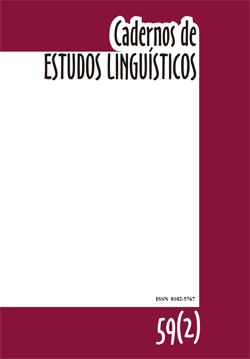Resumo
In this paper, we depart from the hypothesis that face-work is an important dimension of the construction of discourse, regardless the register (oral or written). Drawing on the framework of Pragmatics, we argue that instances of nominalization can operate as politeness strategies, in the sense that they permit, on the one hand, the omission of the actor/agent of a given verbal event and, on the other hand, they contribute to establishing the boundaries of social distance and power relations, as a pervasive feature of formal texts. The empirical data analyzed in this study include academic papers taken from the Academic Corpus of Brazilian Portuguese (CAPB). In the academic papers analyzed, nominalizations operated, to a large degree, as a strategy to mitigate the potential attacks on the positive face of the author himself, acting, therefore, as a strategy of positive politeness.Referências
BIBER, D.; CONRAD, S. Variation in English: multi-dimensional studies. London: Routledge, 2014.
BROWN, P. Politeness and language. International Encyclopedia of the Social & Behavioral Sciences. v. 18. 2015, p. 326-330.
BROWN, P.; LEVINSON, S. Universals in language usage: Politeness phenomena. Questions and politeness: Strategies in social interaction. Cambridge University Press, 1978, p. 56-311.
BROWN, P; LEVINSON, S. Politeness: some universals in language use. Cambridge: Cambridge University Press, 1987.
CHAFE, W. Discourse, consciousness, and time: the flow and displacement of conscious experience in speaking and writing. Chicago: University of Chicago Press.
CULPEPER, J. Towards an anatomy of impoliteness. Journal of Pragmatics, 25, 1996, p. 349-367.
CULPEPER, J. Politeness and impoliteness. In: K. AIJMER; G. ANDERSEN (Eds.), Handbooks of Pragmatics: Sociopragmatics. Berlin: Mouton de Gruyter, 2011, p. 391-436.
CUNHA, G. X. As relações retóricas e a negociação de faces em debate eleitoral. Confluência, n. 47, 2015, p. 205-238.
EELEN, G. A critique of politeness theories. Manchester: St. Jerome Publishing, 2001.
FRASER, B. An approach to discourse markers. Journal of Pragmatics 14.3, 1990, p. 383-398.
FRASER, B. Pragmatic competence: the case of hedging. In: GUNTHER KALTENBÖCK, G.; MIHATSCH W.; SCHNEIDER, S. (Eds.) New approaches to hedging. Bradford: Emerald Group Publishing, 2010, p. 15-34.
GIVÓN, T. Topic continuity in discourse. Amsterdam: John Benjamins Publishing Company, 1983.
GOFFMAN, E. (1967). Interaction Ritual. New York: Pantheon. Crismore, A., & Vande Kopple, W, 1988.
GOFFMAN, E. La mise en scène de la vie quotidienne: les relations en public. v. 2. Paris: Les éditions de minuit, 1973.
GRICE, H. P. Logic and conversation. In: COLE, P.; MORGAN, J. L. (Eds.) Sintax and semantics: speech acts. New York: Academic Press, 1975, p 41-58.
HALLIDAY, M. A. K. An introduction to functional grammar. (Revised by Christian M. I. M. Matthiessen.) London: Hodder Arnold Publication, 2014.
HALLIDAY, M. A. K.; MARTIN, J. R. Writing science. Literacy and Discourse Power. London: Flamer Press, 1993.
HALLIDAY, M.; HASAN, H. Language, context, and text: aspects of language in a social-semiotic perspective. Oxford: Oxford University Press, 1989.
HAUGH, M. Disentangling face, facework and im/politeness. Sociocultural Pragmatics, v. 1(1), 2013, p. 46-73.
HYLAND, K. Hedging in Scientific Research Articles. Amsterdam: John Benjamins Publishing Company, 1998.
KERBRAT-ORECCHIONI, C. Les interactions verbales. Paris: Colin, 1992.
KERBRAT-ORECCHIONI, C. Análise da conversação: princípios e métodos. São Paulo: Parábola Editorial, 2006.
LAKOFF, R. What you can do with words: politeness, pragmatics and performatives. In: ROGERS, A.; WALL, B; MURPHY, J. P. (orgs.) Proceedings of the Texas Conference on performatives, presuppositions and implicatures. Arlington: Center for Applied Linguistics, p. 94-120, 1977.
LAKOFF, R. Talking Power: The Politics of Language in our Lives. New York: Basic Books. 1990.
LEECH, G. Principles of pragmatics. Londres: Longman, 1983.
LEECH, G. The pragmatics of politeness. Oxford: Oxford University Press, 2014.
MARTIN, J. R. Incongruent and proud: de-vilifying 'nominalization'. Discourse & Society, 19.6, p. 801-810. 2008.
MYERS, G. The pragmatics of politeness in scientific articles. Applied linguistics 10.1 1989, p. 1-35.
MENDONÇA, M. C.; OLIVEIRA, A. L. A. M. From the production of abstracts to instances of grammatical metaphors: some research insights to uncover the academic domains. Revista Raído, no prelo.
MOREIRA FILHO, J. L. Kitconc 4.0. 2008. Disponível em: <http://www.fflch.usp.br/dl/li/x/?p=394> Acesso em 8 ago. 2013.
MUSA, A. Hedging In Academic Writing: A Pragmatic Analysis Of English And Chemistry Masters’ Theses In A Ghanaian University. English for Specific Purposes 42 (2014): 1-26.
OLIVEIRA, A. L. A. M.; MIRANDA, M. A. Corpus Acadêmico do Português Brasileiro (CAPB). Universidade Federal de Minas Gerais. 2017.
SCOLLON, R.; SCOLLON, S. W. Intercultural communication: a discourse approach. Oxford: Blackwell, 1995.
TAVERNIERS, M. Grammatical metaphor and lexical metaphor: Different perspectives on semantic variation. Neophilologus, v. 90, 2006, p 321-332.
WATTS, R. J. Linguistic politeness research: Quo vadis? In: WATTS, R. J.; SACHIKO, I.; EHLICH, K. (Eds.) Politeness in Language: studies in its History, Theory and Practice. Berlin: Mouton de Gruyter, 2005, p. 11-47.
O periódico Cadernos de Estudos Linguísticos utiliza a licença do Creative Commons (CC), preservando assim, a integridade dos artigos em ambiente de acesso aberto.

